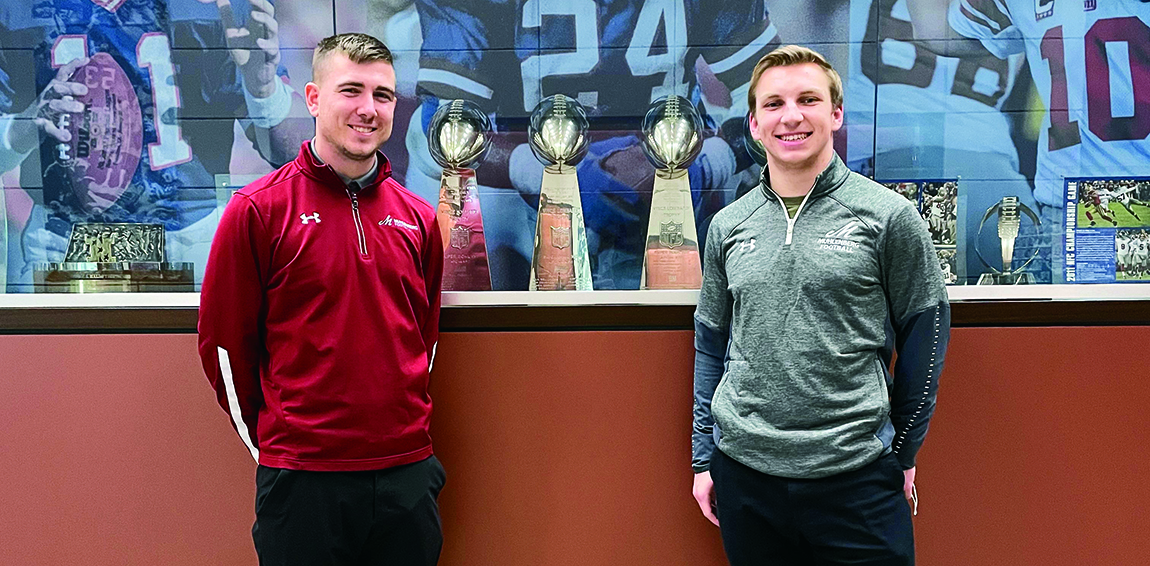From Mules to Giants
Two young alumni, who studied computer science and mathematics as student-athletes at Muhlenberg, are applying their analytical skills behind the scenes with an NFL team.By: Mike Falk Monday, March 21, 2022 09:19 AM
 Luke Wiley ’19 and Max Kirin ’20, data analytics and video interns for the New York Giants, at the team’s practice facility
Luke Wiley ’19 and Max Kirin ’20, data analytics and video interns for the New York Giants, at the team’s practice facilityFor Luke Wiley ’19, REU at Muhlenberg led to the NFL.
In the summer of 2018, Wiley participated in the Department of Mathematics and Computer Science’s Research Experiences for Undergraduates program, using statistical data from the football team’s 2017 season to create a fourth-down model designed to help a coach decide whether to go for it, kick a field goal or punt the ball.
It’s something football coaches at all levels need to decide, and in 2021, Wiley and Max Kirin ’20 worked with football coaches at the highest level, serving as data analytics and video interns for the New York Giants.
Kirin, a two-time all-conference wide receiver for the Mules, computer science major and mathematics minor, was on the scene first. The Giants hired him soon after he graduated, and he spent the whole 2020 season with the team. Wiley, a two-time all-conference defensive back, mathematics major and computer science minor, joined Big Blue the following summer after coaching stints at Lycoming College and SUNY Maritime.
Together with three other former college football players, Kirin and Wiley worked on
analytical projects in areas ranging from scouting of opponents and coaching strategy to the salary cap and injury risk.
“Probably the coolest thing that I’ve been able to work on is surveying the landscape of possible free agents and possible draft picks,” Kirin says. “I also helped implement a bunch of different things like interactive depth charts, basically digitizing material that the coaches use on a regular basis.”
The former Mules dealt directly with the Giants coaching staff, including former Head Coach Joe Judge, who was let go at the end of the 2021 season. On occasion, the coaches ask the interns for specific cutups (for example, a video of all the third-and-long plays another team has run) and lists of plays.
“I worked on one [project] where the coaches wanted to run more heavy formations with more linemen, focusing on running the ball when it was getting colder and we were going to have more games in bad weather,” Kirin says. “I didn’t necessarily tell the coaches what to do, but seeing what I presented to them come to fruition in the game was kind of cool.”
On game days, Kirin and Wiley assisted primarily with video aspects of the game. Kirin would be on the sidelines handing out tablets to players so they could review the video from recent plays. Wiley was up in the coaching booth making sure that the video was ready to upload for the coaches to analyze following the game.
“Being up in the box, really high, having that sky view, is my favorite view of football,” Wiley says. “Seeing the whole play develop from above is so cool. I was always up in the box when I was coaching. And you might have bad camera angles at Division III, but in the NFL, it’s crystal clear.”
Bad camera angles notwithstanding, both Kirin and Wiley drew heavily on their Muhlenberg football experience in their roles with the Giants.
“Our staff at Muhlenberg was incredible,” Kirin says. “My football intelligence went off the charts. Just being able to soak in all the knowledge that they were able to give me in meetings, that lingo becomes so natural.”
For Wiley, one of the most important lessons he learned at Muhlenberg was less technical: “I learned that hard work is the price of admittance,” he says. “You got here because you work hard, and you have to continue working hard. You have to be agile on your feet and continue to look at things from different angles and perspectives and be able to get creative in situations you might not have. The difference between the best NFL teams and the worst ones is very small. That’s why coaches spend so much time looking for the smallest difference or the smallest tell.”
One of the best parts of the job for the former Mules was that they had Saturdays off, allowing them to follow their alma mater. The current Mules had another banner season in 2021, sharing the Centennial Conference championship with Johns Hopkins and defeating Framingham State and Delaware Valley in the NCAA Tournament to advance to the quarterfinals for the third straight season. Muhlenberg lost an overtime thriller to perennial Division III power Mount Union in the quarterfinals and was ranked seventh in the final national poll. The season was especially rewarding for Kirin, whose younger brother Spencer Kirin ’21 was one of the Mules’ top players, earning All-America honors at linebacker.
Both Kirin and Wiley are on board with the Giants until June, when they will see what changes, if any, the new coaching leadership will make with their positions. But whether it’s with the Giants or somewhere else, they have both found their calling.
“I love football and I love math, and however I can continue to have that intersection of my two passions is really all that matters to me,” Wiley says. “Finding something that I enjoy doing has been a pretty awesome experience every single day.”
